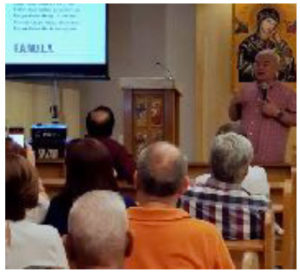CEFAM’s Fr. James Gascon on Amoris Laetitia and Family Love
 Last February 20, at the February mass and prayer meeting of the Diwanihan Kristiyano Prayer Group, Fr. James Gascon S.J., Pastoral Psychotherapist and Professor at the Loyola School of Theology, and President of Ruben M. Tanseco Center for Family Ministries (RMT-CEFAM), gave a pastoral reQlection on Amoris Laetitia, or, Joy of Love. He reflected on love of family and the challenges that families face.
Last February 20, at the February mass and prayer meeting of the Diwanihan Kristiyano Prayer Group, Fr. James Gascon S.J., Pastoral Psychotherapist and Professor at the Loyola School of Theology, and President of Ruben M. Tanseco Center for Family Ministries (RMT-CEFAM), gave a pastoral reQlection on Amoris Laetitia, or, Joy of Love. He reflected on love of family and the challenges that families face.
‘Amoris Laetitia’, which translates in English to, ‘The Joy of Love’ was a postsynodal apostolic exhortation by Pope Francis dated March 19, 2016 and released April 8, 2016. The exhortation addresses the pastoral care of families and covered a wide range of topics related to marriage and family life as well as the contemporary challenges faced by families throughout the world. It encouraged both pastors and members of the laity to accompany and care for families and others in situations of particular need. Amoris Laetitia also included an extended reflection on the meaning of love in the day-to-day reality of family life.
As an introduction, Fr. James pointed out that this Apostolic Exhortation by Pope Francis brings together the results of two Synods on the family convoked by Pope Francis after almost three years of consultations with Catholics all over the world. It was in effect a call for love in the family.
Fr. James first addressed the question, ‘what makes a family?’ He discussed several dimensions:
‣ Genetics, which refers to the biological process where a parent passes certain genes onto their children or offspring. Every child inherits genes from both of their biological parents and these genes in turn express specific traits.
‣ Connections, or the ability to bond with and show active concern for one another characterized by common values and a sense of community
‣ Relationships, which is the interaction of the individual member of the family with other members of the family in its three dimension: how the individual relates to himself/herself and the God within, how the individual relates with other members of the family and the God in each of them and how the person relates to other persons outside his/her family and the God through them.
‣ Vulnerability, that is, when the well being of families are threatened by individual , parental or family circumstances like poverty, single parenting, relationship problems, etc.
‣ Love, with the family providing a framework for each member to grow as a person in love and security. If we accept that God’s love is unconditional, we will become capable of giving boundless love and forgiveness.
The Amoris Laetitia exhortation posited three key messages:
1. Families are places where God and his love are present and at work. “The Lord’s presence dwells in real and concrete families with all their daily troubles and struggles, joys and hopes.” (AL 515). The family is a place where children first learn to love, respect, relate and interact with others. “All of us should be able to say, thanks to the experience of our life in the family: ‘We come to believe in the love God has for us ’ (AL 290) .The experience of God’s love allows us to love others.
2. All families need to be helped to grow in love. “No family drops down from heaven perfectly formed; families need constantly to grow and mature in the ability to love.” (AL 325). No family is perfect and families experience tremendous difficulties and challenges in our time. But there also exists the unconditional love that families give despite the difficulties. As Pope Francis states: “I thank God that many families, which are far from considering themselves perfect, live in love, fulfill their calling and keep moving forward, even if they fall many times along the way.” (AL 57)
3. Families in difficulty and persons in imperfect relationships should be treated with love and mercy. “The Church must accompany with attention and care the weakest of her children, who show signs of a wounded and troubled love.” (AL 291). A pastor cannot feel that it is enough simply to apply moral laws to those living in ‘irregular’ situations, as if they were stones to throw at people’s lives (AL 305). Jesus wants a Church attentive to the goodness which the Holy Spirit sows in the midst of human weakness.
 Love makes – or breaks – a family. Pope Francis reflected on love’s indications.
Love makes – or breaks – a family. Pope Francis reflected on love’s indications.
1. Love is not rude. In our own families we must learn to imitate Jesus’ own gentleness in our way of speaking to one another. Speak with respect, courtesy, gentleness, encouragement.
2. Love is not resentful. The opposite of resentment is forgiveness. Seek to understand other people and to forgive them.
3. Love bears all things. Know when and how to be silent about the weaknesses of others. Limit judgement. Check the impulse to condemn.
4. Love believes in all things. Those who know they are trusted can be open and hide nothing; those who know their spouse is always suspicious will tend to keep secrets. So know how to trust.
5. Love hopes all things. Know how to hope for change or some good in others or during a difficult situation. Love bears every trial with a positive attitude.
Fr. Gascon’s talk concluded with a prayer:
Holy Family of Nazareth, make us once more mindful of the sacredness and inviolability of the family, and its beauty in God’s plan.
Jesus, Mary and Joseph, Graciously hear our Prayer. Amen.
